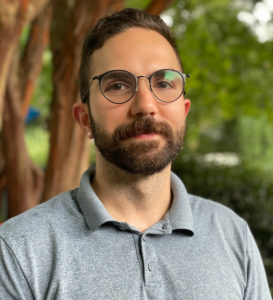
This post was written by Rolando Rodriguez (@bibliothicario), who attended the 2022 DLF Forum as a Student Fellow.
Rolando is pursuing his M.S.I.S. at the University of North Carolina – Chapel Hill as a Carolina Academic Libraries Associate. Prior to this program, Rolando obtained a master’s degree in philosophy of religion from Yale Divinity School in New Haven, Connecticut and worked as an educational coach. Rolando’s professional and research interests primarily revolve around using digital methods and tools to explore the questions pertinent to the humanities and social sciences. He is also passionate about multilingualism and issues of translation within the digital humanities. Rolando serves as an editor for the Programming Historian and the Journal for Interactive Technology and Pedagogy. In his free time, Rolando enjoys reading poetry and philosophy, hiking, and has recently begun building his first cyberdeck computer.
The opportunity to attend the Digital Library Federation’s 2022 Forum provided many highlights. There were serendipitous conversations with individuals I had not expected to see or scholars whose work I have long admired. I cherish the opportunity I had to connect with the other Forum Fellows, share our professional and personal ambitions, and create connections that will hopefully continue years after the conference. The small dance-fest in the Renaissance lounge will also certainly be a long-cherished memory (and hopefully the first of a great DLF Forum tradition!).
I also think back to one particular session, which has helped me thread many of my thoughts about the conference together: Foundations for Building Community within the Workplace. The three presentations during that session spanned topics such as self care in the workplace, radical interdependence, and institutional knowledge. The teams’ reflections illustrated how each of them had to devise community-based solutions to address institutional needs and issues. Each presentation demonstrated the importance of leaving behind practices that reproduce toxic productivity or individualistic workplace cultures, which tend to produce mass burnout for many involved. I left that session with a reminder that for a community to truly be created in the institutions we find ourselves in, our work and our priorities must center around the very people that are doing that labor: listening, caring, and trusting them. This requires intentional actions of addressing hidden labor, creating networks of trust between colleagues, and transparency.
Many of us are already aware that it is the communication we share and relationships we establish with faculty, students, or other stakeholders that informs much of the work we do in our institutions: our workshops, digitizing effort, and creation of other resources. Likewise, the only sustainable manner to continue building the future of digital libraries is to honor the rich relationships we share with colleagues, scholars, and collaborators that form the communities we are embedded in. Shouldn’t we then work to include interrogations concerning the equitable distribution of labor or honor colleagues’ expertise (beyond the problematic credential system) when making decisions within our workflows and workplace cultures? I believe our concerns should be on the individuals doing the labor we talk about as much (if not more!) as the labor itself.
Conferences, like the DLF Forum, provide opportunities to engage in such practices. We carefully listen to the insights of presenters and incorporate their reflections and wisdom into our own work. We often trust the presenters enough to seek further guidance after a session because they inhabit positionalities, experience, or expertise that we don’t. Every now and then, we may seek to challenge thoughts that are potentially harmful to certain populations. Outside of sessions, we may intentionally seek colleagues with whom we wish to to check in and connect. These practices are integral to the formation of a strong scholarly community.
I am thankful for being able to attend the DLF Forum as a Forum Fellow, as I’m left with a series of provocations to guide and form the beginning of my career in digital libraries: What would our workplaces look like if we incorporate just some of these conference practices on a more regular basis? How would our institutions change if our priorities centered people as much as projects? Could we imagine what kind of scholarly community we could create then?
Thank you to Texas Digital Library, sponsor of the 2022 DLF Forum Student Fellowships.

